|
|
|
Sort Order |
|
|
|
Items / Page
|
|
|
|
|
|
|
| Srl | Item |
| 1 |
ID:
104663


|
|
|
| 2 |
ID:
177571


|
|
|
|
|
| Summary/Abstract |
UN General Assembly (UNGA) voting is non-binding, unlike voting in the Security Council (UNSC), yet is considered to reflect states’ interests. This article attempts to explore, compare, and explain patterns in UNGA voting of two regional organisations (ROs) on Israel-related resolutions, and/or issues that are of importance to Israel. Israel has been a unique case when it comes to the UN, which has shown pervasive hostility towards the Jewish state over the past decades (e.g. 83 of the 97 UNGA resolutions criticising countries in 2012–15 [or 86%] were directed against Israel). While most researchers agree that ROs differ in the level of their group vote uniformity, this article argues that states’ voting on resolutions related to Israel also varies within ROs and over time. As such, it sheds light on internal changes within the examined ROs (the Arab League and the EU) and shows important differences among members of these organisations.
|
|
|
|
|
|
|
|
|
|
|
|
|
|
|
|
| 3 |
ID:
155159


|
|
|
|
|
| Summary/Abstract |
How China assumes its position of superpower is one of the most important questions regarding global order in the twenty-first century. While considerable and sustained attention has been paid to China’s growing economic and military might, work examining how China is attempting, if at all, to influence the ecosystem of global norms is in its earlier stages. In this article we examine China’s actions in an important venue for the development of global norms, the United Nations General Assembly (UNGA). Using a unique dataset that captures how other countries move into or out of alignment with China on UNGA resolutions that are repeated over time, we find statistical evidence that China used diplomatic and economic means in an attempt to subtly alter international norms. We further illustrate these findings by examining four states that made substantive moves toward China on resolutions concerning national sovereignty, democracy, international order, non-interference, and human rights.
|
|
|
|
|
|
|
|
|
|
|
|
|
|
|
|
| 4 |
ID:
129201
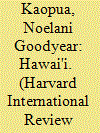

|
|
|
|
|
| Publication |
2014.
|
| Summary/Abstract |
The lawful Government of Hawaii was overthrown without the drawing of a sword or the firing of a shot by a process which, it may be safely asserted, is directly traceable to and dependent for its success upon the agency of the United States acting through its diplomatic and naval representatives…By an act of war, committed with the participation of a diplomatic representative of the United States and without authority of Congress, the Government of a feeble but friendly and confiding people has been overthrown. A substantial wrong has thus been done which a due regard for our national character as well as the rights of the injured people requires we should endeavor to repair.
|
|
|
|
|
|
|
|
|
|
|
|
|
|
|
|
| 5 |
ID:
188496
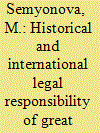

|
|
|
|
|
| Summary/Abstract |
GREAT BRITAIN, once the biggest colonial power, steadily expanded by way of the natural resources of its controlled possessions, the export of their cultural values, and the slave trade. The empire's political and economic vibrancy required strong moral "tenets" that led to the formation of a hypocritical ideology - an alloy of cynical prosperity on the "bones" of enslaved peoples, enlightening messianism, and the heavy "white man's burden" as an alleged source of progress for the rest of the world. Colonialism was and remains, to an extent, a factor of national pride, a combination of imagined racial-ethnic exceptionalism and a condescending attitude toward others. Hence the more or less widely accepted opinion among Britons that the demands, especially of India and Pakistan, that Great Britain repent for the sins of the colonial past are untenable, since under imperial patronage, these countries enjoyed all the boons of civilization, democracy, and free trade.
|
|
|
|
|
|
|
|
|
|
|
|
|
|
|
|
| 6 |
ID:
138337
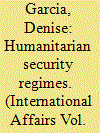

|
|
|
|
|
| Summary/Abstract |
This article introduces a novel concept, humanitarian security regimes, and enquires under what conditions they arise and what is distinctive about them. Humanitarian security regimes are driven by altruistic imperatives aiming to prohibit and restrict behaviour, impede lethal technology or ban categories of weapons through disarmament treaties; they embrace humanitarian perspectives that seek to prevent civilian casualties, precluding harmful behavior, protecting and ensuring the rights of victims and survivors of armed violence. The article explores how these regimes appear in the security area, usually in opposition to the aspirations of the most powerful states. The existing regimes literature has mostly taken a functional approach to analyzing cooperation, lacks a humanitarian hypothesis and does not explore the emergence of new regimes in the core area of security. The author argues that in the processes of humanitarian security regime-making, it is the national interest that is restructured to incorporate new normative understandings that then become part of the new national security aspirations. This article intends to fill this gap and its importance rests on three reasons. First, security areas that were previously considered to be the exclusive domain of states have now been the focus of change by actors beyond the state. Second, states have embraced changes to domains close to their national security (e.g. arms) mostly cognizant of humanitarian concerns. Third, states are compelled to re-evaluate their national interests motivated by a clear humanitarian impetus. Three conditions for the emergence of humanitarian security regimes are explained: marginalization and delegitimization; multilevel agency, and reputational concerns.
|
|
|
|
|
|
|
|
|
|
|
|
|
|
|
|
| 7 |
ID:
148106
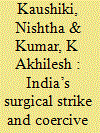

|
|
|
|
|
| Summary/Abstract |
India had been virtually driven to the wall in the wake of yet another terrorist attack on Indian army base in Uri. It has revived the memories of the Kaluchak and Pathankot attacks, and, 26/11. As India was caught unaware, it was probably believed by the government in power that an absolute majority in the Parliament and, after a stern warning after the Pathankot attack, Pakistan would probably not attempt any other mischief. While addressing a rally in Kerala, Prime Minister Narendra Modi stated that India will neither forget nor forgive the enormity of the Uri attack. This was also further followed by External Affairs Minister Sushma Swaraj’s evocative speech at the United Nations General Assembly (UNGA). However, the surgical strikes were unexpected given the policy of strategic restraint that India had followed in the past and indeed it was a resolute decision.
|
|
|
|
|
|
|
|
|
|
|
|
|
|
|
|
| 8 |
ID:
141022
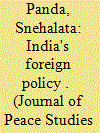

|
|
|
| 9 |
ID:
138324
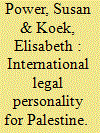

|
|
|
| 10 |
ID:
139529


|
|
|
|
|
| Summary/Abstract |
This study examines the effect of domestic political change on United Nations General Assembly (UNGA) voting. We argue that foreign policy change is most likely when a new leader—one who relies on different societal groups for support than her predecessor—comes to power. We then examine the extent that domestic institutional context—in particular, democracy—shapes this process. We test our hypotheses using a new measure of UNGA voting patterns and new data on changes in leaders' supporting coalitions. We find that change in the societal support base of leaders leads to change in UN voting, especially in nondemocracies. This study lends credence to the perspective that foreign policy, like domestic policy, can vary with the particular interests that leaders represent; it encourages scholars to focus less on leadership change per se and more on changes in the societal groups to which leaders are most accountable. This study also suggests that democratic institutions inspire policy consistency not only in areas governed by treaties and international law, but also in areas of foreign policy that are easier to alter in the short term.
|
|
|
|
|
|
|
|
|
|
|
|
|
|
|
|
| 11 |
ID:
139599
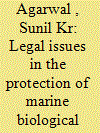

|
|
|
|
|
| Summary/Abstract |
States are facing new challenges with respect to conservation and sustainable use of marine biological diversity in areas beyond national jurisdiction (BBNJ). This underscores a significant gap in the existing legal regime, as embodied in the 1982 United Nations Convention on the Law of the Sea (UNCLOS), for protection of marine biological diversity beyond national jurisdiction. Thus, there is a critical need for a legal instrument to specifically address the regulatory and governance gap in this area. To this end, the United Nations General Assembly (UNGA) has set up an ad-hoc BBNJ Working Group. In January 2015, the BBNJ Working Group recommended that an international legally binding instrument under UNCLOS needed to be developed. This will enable UNGA to decide in its forthcoming 69th Session, in 2015, whether or not to launch negotiations for a new Implementing Agreement under the UNCLOS on the conservation and sustainable use of the marine biological diversity in areas beyond national jurisdiction. The details and contours of the new legal instrument, however, have yet to be agreed to, by the international community. It is suggested that international community may consider the precedent of the United Nations Fish Stock Agreement (UNFSA) for taking the next steps in devising a legal instrument. Further, there is also a need to consider an institutional arrangement to address existing BBNJ governance gaps.
|
|
|
|
|
|
|
|
|
|
|
|
|
|
|
|
| 12 |
ID:
130705


|
|
|
|
|
| Publication |
2014.
|
| Summary/Abstract |
Most states have embraced the emerging Responsibility to Protect norm, which was adopted by the UN General Assembly in 2005. R2P obliges states to prevent atrocity crimes within their own borders and not to turn a blind eye when they occur elsewhere. However, R2P's third pillar, which permits UN Security Council-authorized coercive actions, has been controversial. A few states have rejected R2P, fearing that the third pillar might be misused, while others have localized R2P (adapting it to their own preferences) or have sought to modify it globally through feedback in continuing UN discussions. This article explains the range of responses to the third pillar of R2P and explores why states employ different types of feedback, ranging from soft feedback (which seeks to build broader support for R2P) to hard feedback (which seeks to limit R2P). The article concludes that feedback reflects both national strategic concerns and preexisting local norms. Prior normative commitments to human rights and humanitarianism reduce the incidence of hard feedback whereas normative commitments to anti-imperialism and noninterference increase the likelihood of feedback seeking to constrain R2P. States with mixed commitments (e.g., to both human rights and to anti-imperialism) may offer complex, even contradictory, feedback, reflecting a prevailing national norm hierarchy, changes to which could result in changed state responses to R2P.
|
|
|
|
|
|
|
|
|
|
|
|
|
|
|
|
| 13 |
ID:
101599
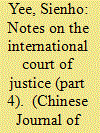

|
|
|
|
|
| Publication |
2010.
|
| Summary/Abstract |
This note first summarizes the Kosovo Advisory Opinion of the International Court of Justice of 22 July 2010 and then makes observations regarding several issues involved in the proceedings: the reformulation of the question presented by the United Nations General Assembly, the interpretation of Security Council resolution 1244 and the Constitutional Framework, self-determination and remedial secession and the unlawful use of force by the NATO in 1999.
|
|
|
|
|
|
|
|
|
|
|
|
|
|
|
|
| 14 |
ID:
118243


|
|
|
| 15 |
ID:
106860
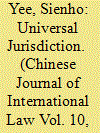

|
|
|
|
|
| Publication |
2011.
|
| Summary/Abstract |
The debates in the UNGA since 2009 on universal jurisdiction reveal great confusion on its concept, scope and application. True or pure universal jurisdiction is jurisdiction solely based on the universal concern character of the crime in issue. The concept and logic of universal jurisdiction is understandable, as each State has an interest in matters of universal concern. Universal jurisdiction can be a powerful instrument for the international system to protect its interests and to protect human rights and fight against impunity. However, the exercise of universal jurisdiction by one State may infringe the sovereignty and sovereign equality of another State and can be abused, thus destabilizing international relations. These pros and cons and other factors have influenced the international law formation process in such a way that so far only universal jurisdiction over piracy has been accepted in international law. There is no "pure universal concern jurisdiction" over other crimes yet. The evidence of State practice on "universal concern plus presence" jurisdiction is not yet substantial so as to afford the finding of a customary international law rule in its favor. Treaty practice providing for "universal concern plus treaty, presence and intra-regime territoriality or nationality jurisdiction" or "universal concern plus treaty and presence jurisdiction" is limited to the particular treaty regime only. In the light of this state of affairs, the possible application of the Lotus dictum and the presence requirement-especially the weak, procedural view of it-can be of significance and deserves attention. The movement for "pure universal jurisdiction" has been "trending down" since the conspicuous silence on the legitimacy of universal jurisdiction in the Arrest Warrant case decided by the ICJ in 2002. The subsequent downtrend may have been in no small measure due to the cautious Judgment in that case. That Judgment can be said to have, in an ingenious way, helped to inject some calming elements back into international relations. With Belgium and Spain now having abandoned pure universal jurisdiction by narrowing down their statutes, the universal jurisdiction movement appears to be a moving train without its locomotive.
|
|
|
|
|
|
|
|
|
|
|
|
|
|
|
|
|
|
|
|
|